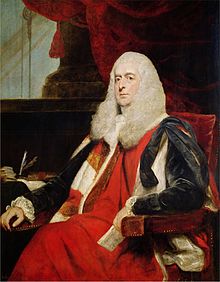Alexander Wedderburn, 1st Earl of Rosslyn
|
The Right Honourable The Earl of Rosslyn PC, KC |
|
|---|---|
 |
|
| Chief Justice of the Common Pleas | |
|
In office 1780–1793 |
|
| Preceded by | Sir William de Grey |
| Succeeded by | Sir James Eyre |
| Attorney General for England and Wales | |
|
In office 1778–1780 |
|
| Preceded by | Edward Thurlow |
| Succeeded by | James Wallace |
| Personal details | |
| Born | 3 February 1733 |
| Died | 2 January 1805 (aged 71) |
Alexander Wedderburn, 1st Earl of Rosslyn, PC, KC (3 February 1733 – 2 January 1805) was Lord Chancellor of Great Britain from 1793 to 1801.
He was the eldest son of Peter Wedderburn (a lord of session as Lord Chesterhall) and was born in East Lothian.
Wedderburn acquired the rudiments of his education at Dalkeith and at the Royal High School, Edinburgh, and in his fourteenth year matriculated at the University of Edinburgh. Though he desired to practise at the English bar, in deference to his father's wishes he qualified as an advocate at Edinburgh, in 1754. His father was called to the bench in 1755, and for the next three years Wedderburn stuck to his practice in Edinburgh, during which period he employed his oratorical powers in the General Assembly of the Church of Scotland, and passed his evenings in social and argumentative clubs.
In 1755 the precursor of the later Edinburgh Review was started, and Wedderburn edited two of its issues. The dean of faculty at this time, Lockhart, afterwards Lord Covington, a lawyer notorious for his harsh demeanour, in the autumn of 1757 assailed Wedderburn with more than ordinary insolence. Wedderburn retorted with extraordinary powers of invective, and, on being rebuked by the bench, declined to retract or apologize. Instead, he left the court forever.
Wedderburn was called to the English bar at the Inner Temple in 1757. To shake off his Scottish accent and to improve his oratory, he engaged the services of Thomas Sheridan and Charles Macklin. To secure business and to conduct his cases with adequate knowledge, he studied the forms of English law. He solicited William Strahan, a printer, to get him employed in city causes, and he entered into social intercourse with busy London solicitors. His local connections and the incidents of his previous career introduced him to the notice of his countrymen Lord Bute and Lord Mansfield.
...
Wikipedia
